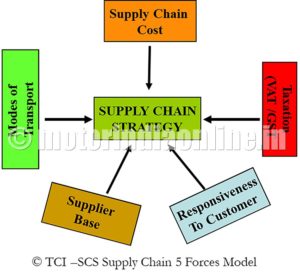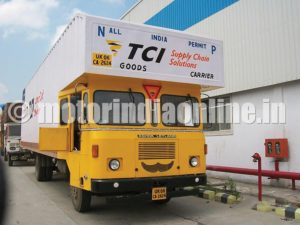TCI Supply Chain Solutions has been a name synonymous with excellence in logistics and supply chain management in the country. With all the action around the impending GST implementation, we spoke to Mr. Jasjit Sethi, CEO, TCI Supply Chain Solutions, to understand how the best in the business is gearing up for the challenges and opportunities ahead in the post-GST era.

Excerpts:
FY17 performance
In 2016-17, TCI Group witnessed a decent growth with revenues of over Rs. 3,000 crores.
The overall improvement in business environment and our continued focus on value-added services have helped us achieve our revenue and margin growth this year. With changing consumption trends, we have achieved traction in building additional ecommerce fulfilment centers and expand other niche logistics sectors.
We have deployed one more high tonnage ship this year on the West coast to strengthen our national multimodal network.
All our business verticals are expecting higher growth in revenue and margins in the coming year with our focus in the areas of providing integrated logistics and warehousing solutions with an advent of GST.
Plans and outlook for FY18
With the sudden announcement by Supreme Court regarding the sale of vehicles compliant with BS-IV norms only, many auto makers are in dismay as they are left with inventory of BS-III vehicles.
While the switchover from BS-III to BS-IV emission norms may have caused a one-time material impact on the auto industry, in the long run it will depend on how good and stable the incoming technology is and whether it can yield lower fuel and operating costs. As this change is thrust upon the OEM and not originating from them, we fear that readiness for new technology in the entire value chain will ensure lower TCO (Total Cost of Ownership) and may be compromised in the short run.
It would auger well for the OEM’s and the industry if they were to prepare for BS-VI and keep in mind that India will remain a cost-sensitive market hence Cost (TCO) Kaizen is key for everyone.
GST impact on logistics sector
With the introduction of GST, the present vertical structure of VAT on Goods and Service Tax on Services will merge into one consolidated GST. However there is a split between central and State so there is a horizontal split in GST between GST for purposes of Input tax credit
For the logistics sector, various measures like Way Bill, Transit Pass, Multi locational offices are additional challenges we have to overcome, besides the Supplier and customer integration.
In terms of the network design, the five main factors affecting Supply Chain as depicted in the TCISCS Supply Chain 5 forces Model would remain, as “Taxation” which would take the hue of Input tax that is available and availed.
Contrary to many schools of thought, while the network would be more Logistically-Right than taxation friendly, the number of warehouses would not really come down in many regions because of closeness to customer is a key factor.
The major impact is seen in areas like NCR (Delhi-Haryana-UP-Rajasthan); Bangalore (KTK, AP, TN) and Kolkata (WB-OR-JH-NE). However, in the short run, the transition of GST will not be simple. It will require some time for the entire supply chain to settle down into a rhythm.
Company’s GST-readiness
We are getting GST ready at a fast pace. The network parts are almost over and at present the IT integrations are underway. Our ERP is home grown and very robust, spanning Mobile Apps and web-based applications, thus we are looking at GST readiness as an additional opportunity to differentiate the TCI offering from rest of the industry in terms of support to customers and suppliers.
Technology adoption
At TCI we believe in entwining a process with technology to get a consistent, efficient and best cost solution. Our ERP has been developed in house to get aligned with various customer processes and demands.
* Fleet Management: We have a dedicated fleet of trucks which are monitored using the latest technology. We use GPS in all the vehicles and track their movement completely. Our reefer vehicles are equipped with GPS integrated with temperature data loggers and GPS/GSM vehicle tracking system for online vehicle and temperature tracking.
* Telematics: We use telematics for the tracking of vehicle movement. Advanced Vehicle Tracking System is used through GPS Standard and Customized Reports, Management Information Systems, Dashboards and Decision Support Systems.
* Fleet Maintenance: We have special arrangements for fleet maintenance and have a centralized team to take care of our fleet’s preventive and corrective maintenance.
* Connectivity: We have all warehouses and offices connected well with internet with our ERP connected across all offices. Our ‘IT Group’ facilitates supply chain visibility within and across networks to complement the physical process. We envisage lots of new trends in transportation and logistics industry – IOT (Internet of Things) is already being widely used. Robotics, Machine Learning and Artificial Intelligence are coming up along with Block chain, VR (Virtual Reality) and AR (Augmented Reality).
Tackling driver shortage
Throughout the past decade, the trucking industry has struggled with a shortage of truck drivers. This challenge has arisen mainly due to low driver wages. Also the trucking industry is becoming more heavily regulated than ever before. Many drivers are distressed by the electronic log system and the ever-changing hours of service regulations, and are leaving the industry.
To tackle this challenge, TCIL has incorporated few internal policies in favor of truck drivers. We are offering better wages and larger signing bonuses to retain the drivers. Also, sufficient training is being provided at TCIL to our drivers to comply with the dynamic regulations of the industry.
Another major challenge in driver shortage is that currently the industry is employing middle-aged people as drivers. As older truck drivers are ageing and retiring, the issue of driver challenge is enhanced. Hence, we are employing younger drivers and guiding them with proper training.
Maintaining physical fitness is an important aspect for the drivers. We at TCIL are motivating drivers towards regular exercise and also conduct such sessions from time to time. We also conduct social activities for the drivers in order to develop a personal connect and a long-term relationship with them.

